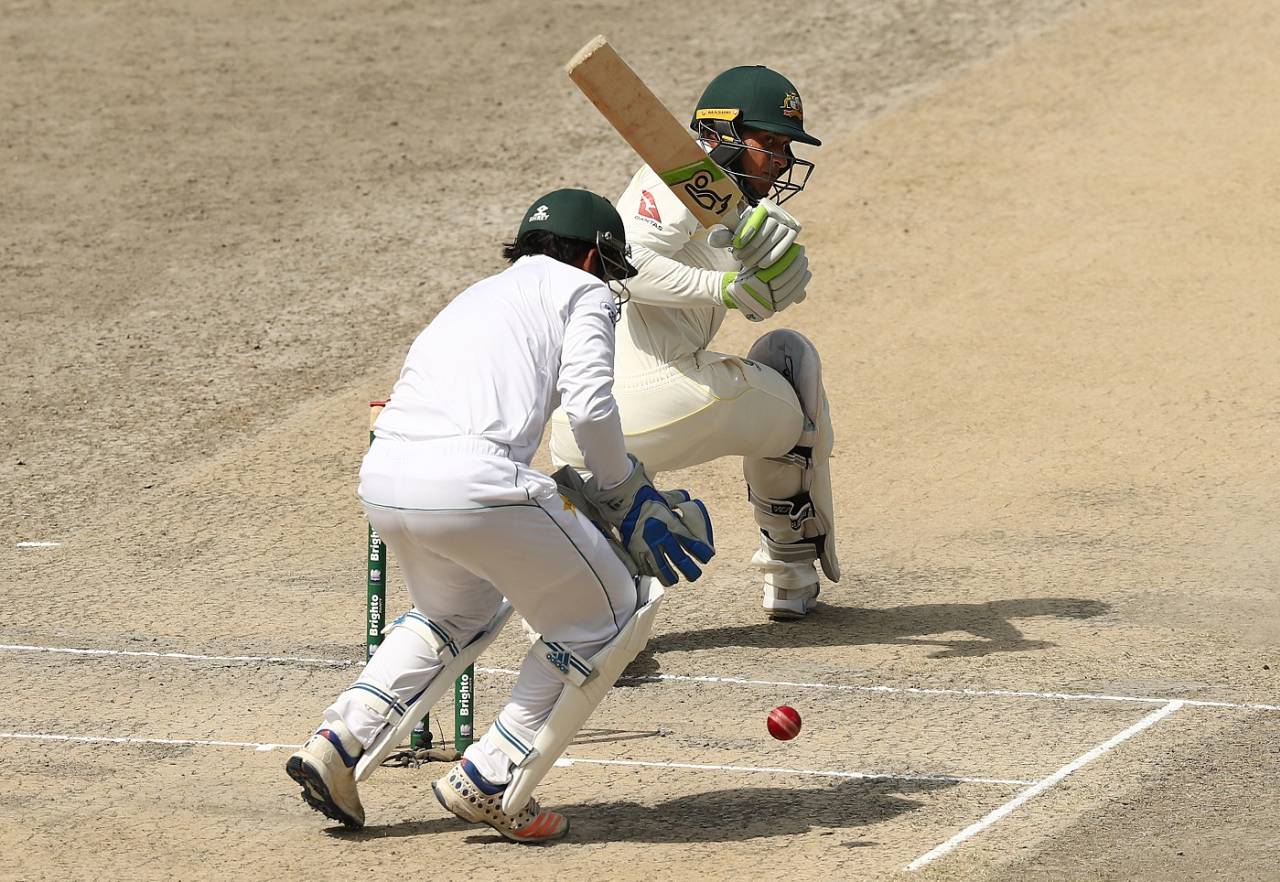Usman Khawaja's giant leap is good news for Australia
Fingerspin has often been the team's downfall, and nearly was in Dubai, but Australia can be proud of what they achieved in the second innings
Ian Chappell
14-Oct-2018

Usman Khawaja revamped his batting approach to good effect • Getty Images
Even at full strength the Australian batting in recent years has shown palpable signs of weakness when the ball swings or spins. Pakistan attacked a severely weakened Australian line-up with both forms of kryptonite, unveiling swing with the old ball and fingerspin to dismantle their first innings in Dubai. Against this twin assault, Tim Paine's tyros were powerless to halt Pakistan's progress but at least in the second innings they displayed thoughtfulness and determination along with resolute defence to clinch a draw.
The leader of their resistance was the previously leaden-footed Usman Khawaja. The elegant left-hander displayed the benefit of a well-planned rethink of his approach to facing spin bowling, and an elevation to the top of the order. The most productive batting of the Test match came against the new ball where the opening partnerships prospered.
In fact, there was a period in Australia's first innings where the team could have answered with a confident rejoinder, "What weakness against spin?" as they cruised to 142 without loss. However, at that point they suffered another all-too-familiar collapse, losing ten wickets for a paltry 60 runs.
This Lehman Brothers-like collapse was precipitated by the offspin of debutant Bilal Asif, who deploys a version of the highly successful Muttiah Muralitharan form of fingerspin, which involves a lot of wrist work. Asif's deceptive flight and bounce bamboozled the Australian left-handers and opened the door for the highly efficient medium-pacer Mohammad Abbas to barnstorm the lower order with his relentlessly accurate swing bowling.
This effective combination set Pakistan - who are as at home in the desert as Lawrence of Arabia - on the path to what should have been yet another "home turf" victory.
Nevertheless the inexperienced Australians shouldn't feel too downcast because far better baggy-green line-ups have been destroyed by offspin, albeit from bowlers with much more illustrious CVs. In my memory this malaise started with England's Jim Laker in 1956 and gathered pace at the beginning of the new century with Harbhajan Singh, and more recently his Indian counterpart R Ashwin, along with occasional misfires against Murali (in Sri Lanka), Pakistan's Saqlain Mushtaq and Graeme Swann of England.
In the controversy-laden 1956 season Laker plundered a strong Australian line-up that included the 1948 Invincible team members Neil Harvey and Keith Miller to the tune of 46 wickets at an average of 9.6. That included 19 on a specifically prepared Old Trafford dustbowl.
When I played my one game for Lancashire at Old Trafford in 1963, I asked the humorous and refreshingly honest groundsman Bert Flack about that pitch. "Oooh, 'twere a bluddy bad 'un," he replied with a chuckle. "Them's at 'eadquarters [Lord's, I assumed] told me t'prepare a bleedin' turner," he continued with a grin, "and a bleedin' turner 'twere."
Not surprisingly, modern Australian teams are often greeted with "bleedin' turners" but minus the humorous admission from local authorities. The pitch in Dubai, however, could only be classified as a mild turner; it was far from a spitting cobra, and appeared to hibernate on the last day.
The Australians produced a more studious approach in their second innings and following the example set by Khawaja, they unravelled the mystery of Asif and fought out a confidence-boosting draw.
Khawaja was a man on a mission as he set out to prove that his previously poor record in conditions of this sort was a thing of the past. He had a more aggressive approach that resulted in sharper footwork and profited from an improved fitness regime, and he displayed skill, determination and extraordinary stamina in demanding conditions.
Following the suspension of their two most proficient batsmen, Steven Smith and David Warner, Australia badly needed Khawaja to display progress. He took a giant leap forward to help fill the void and deny a conservative Pakistan what seemed to be a certain victory after another calamitous first-innings collapse.
Former Australia captain Ian Chappell is a cricket commentator for Channel Nine, and a columnist